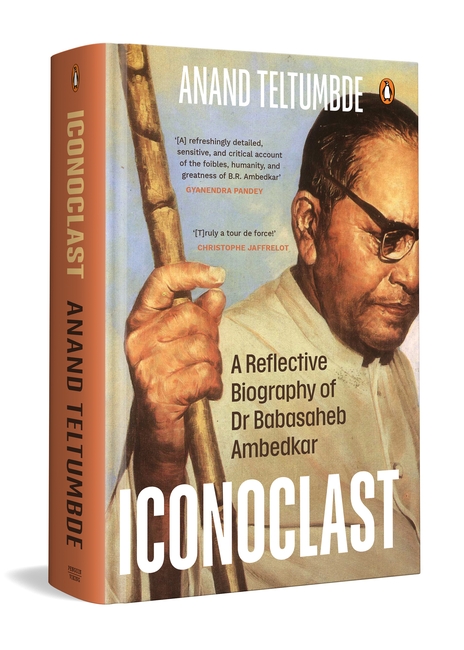by ASHOK GOPAL

This reflective biography of B.R. Ambedkar offers a detailed account of Ambedkar’s life and work. Its strength lies in author Anand Teltumbde’s insightful evaluation. There are shortcomings, but the analysis provides a valuable perspective on Ambedkar’s legacy.
Iconoclast: A Reflective Biography of Dr Babasaheb Ambedkar by Anand Teltumbde (2024; Penguin Random House India, 843 pages)
In his posthumously published tome, The Buddha and his Dhamma, B.R. Ambedkar presents his view of the Buddha’s life and his teachings, according to purposes he considers important. In the process, he departs from established narratives and interpretations.
In Iconoclast: A Reflective Biography of Dr Babasaheb Ambedkar, Anand Teltumbde follows the same approach, with one crucial difference. Ambedkar does not criticise the Buddha. Teltumbde, on the other hand, asserts that Ambedkar was wrong on many issues.
But this opinion does not form the bulk of his book. As is the case with Dhamma, Iconoclast is mainly a detailed account of the life of a person and his ideas on several issues. Into this account, Teltumbde inserts evaluative comments.
The comparison of Iconoclast with Dhamma may seem gratuitous, particularly as Teltumbde does not discuss Dhamma at all. The parallel did not strike me either, until I re-read Iconoclast and paused at a question posed by Teltumbde in his preface.
If, he asks, Ambedkar could challenge the “well-entrenched story” of the Buddha by “weighing ‘facts’ on the touchstone of reality” in Dhamma, why could not the same thing be done with the well-established account of Ambedkar’s life and achievements?
By way of an answer, Teltumbde undertakes the daunting task. Anyone who has been following his writings over the past few decades would agree he is eminently qualified for the job.
Fiercely independent, he has been critical of the Indian Right as well as the Left, and all that supposedly falls in the middle. Born in a Dalit family and related to Ambedkar’s family by marriage, he has also written critically about Ambedkar and the politics carried out by people who claim to be his followers.
Driving Teltumbde’s trenchant writings is the conviction that what India needs foremost is a class-based people’s movement, which recognises the reality of caste and seeks to annihilate it. Towards this end, he has worked as an activist and ideologue.
Taking time off from his professional life as a corporate business head and later management academic, he has also done valuable archival work. Before anyone else, he digitised the volumes of Dr Babasaheb Ambedkar Writings and Speeches (BAWS) published by the Government of Maharashtra, and made them available online.
Digging into government records and other primary sources, he wrote Mahad: The Making of the First Dalit Revolt (2016), a detailed account of two events that took place in 1927 at Mahad (Maharashtra), marking the beginning of the Ambedkar chalval (movement). Among Teltumbde’s other contributions towards a better understanding of Ambedkar is Myths and Facts: Ambedkar on Muslims (2003), a tract exposing the deliberate misreading of Ambedkar’s Pakistan or the Partition of India (1945) by Hindutvavadis.
Against this background, the publication of Iconoclast is, in itself, a noteworthy event. The book emerged in difficult conditions, which Teltumbde recounts in the preface.
Soon after he began on the project in 2018, the powers that be decided he was an enemy of the nation, to be put behind bars under the Unlawful Activities Prevention Act (UAPA). Due to fortuitous circumstances, he managed to launch a legal defence before being arrested. A tortuous struggle for anticipatory bail followed.
Much of Iconoclast was written during this period of around 20 months, under the cloud of possibly prolonged imprisonment with the attendant risk of contracting Covid-19 at an advanced age (he is in his early seventies now).
Teltumbde lost the first round of the legal battle, and was taken to Taloja (Navi Mumbai) jail on 14 April 2020, Ambedkar’s birth anniversary. He was confined there for 31 months until the Supreme Court ordered his conditional release in November 2022.
During his time in jail, his book project came to a halt. However, he got to review my manuscript of A Part Apart: The Life and Thought of BR Ambedkar, sent to him by the publisher, S Anand of Navayana. (Teltumbde’s comments led me to rewrite some portions and correct a few howlers.)
Teltumbde thought that A Part Apart was the kind of Ambedkar biography he “desired”, but there was a need for a “reflective” biography that would “go beyond a dispassionate life story”. Supplemented with his reflections, such a biography would help “people understand the forces that shaped their lives and enable them to assume agency to rethink their present”.
After his release, he completed Iconoclast according to that scope. Most of the book is a detailed account of Ambedkar’s life and work 1 , drawn mainly from C.B. Khairmode’s 12-volume Dr Bhimrao Ramji Ambedkar (Marathi) and BAWS, but the book’s USP is Teltumbde’s evaluation of Ambedkar, which is spread across several chapters. The gist of his report card is as follows.
The India Forum for more
